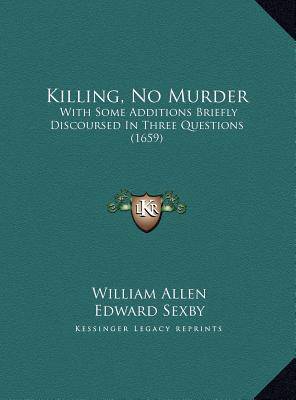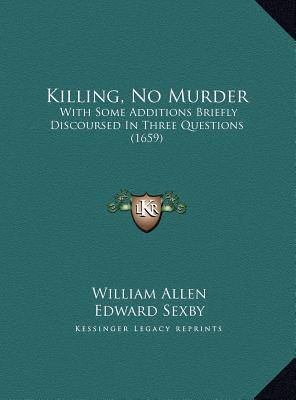
- Retrait gratuit dans votre magasin Club
- 7.000.000 titres dans notre catalogue
- Payer en toute sécurité
- Toujours un magasin près de chez vous
- Retrait gratuit dans votre magasin Club
- 7.000.0000 titres dans notre catalogue
- Payer en toute sécurité
- Toujours un magasin près de chez vous
Killing, No Murder
With Some Additions Briefly Discoursed In Three Questions (1659)
William Allen, Edward Sexby
Livre relié | Anglais
43,45 €
+ 86 points
Format
Description
Killing, No Murder: With Some Additions Briefly Discoursed In Three Questions is a book written by William Allen in 1659. The book is a political tract that argues for the assassination of Oliver Cromwell, who was the Lord Protector of England at the time. The title of the book is a play on words, as it suggests that killing Cromwell would not be murder, but rather an act of justice. The book is divided into three parts, each of which consists of a series of questions and answers. The first part examines the moral and legal justification for killing a ruler who has become a tyrant. The second part discusses the practical aspects of carrying out such an assassination, including the selection of a suitable assassin and the methods that could be used to carry out the killing. The third part considers the likely consequences of killing Cromwell, including the potential for civil war and the possibility of foreign intervention.Throughout the book, Allen argues that Cromwell is a tyrant who has betrayed the principles of the English Revolution. He accuses Cromwell of being a hypocrite who has used his power to enrich himself and his family, and of being responsible for the deaths of many innocent people. Allen contends that killing Cromwell would be a justifiable act of self-defense, and that it would be a necessary step towards restoring the liberties that had been lost under his rule.Killing, No Murder: With Some Additions Briefly Discoursed In Three Questions is an important historical document that provides insight into the political and social climate of England during the mid-17th century. It is also a fascinating example of political propaganda, and a reminder of the power of words to shape public opinion and influence political events.Fit For Public View, To Deter And Prevent Single Persons, And Councils, From Usurping Supreme Power.This scarce antiquarian book is a facsimile reprint of the old original and may contain some imperfections such as library marks and notations. Because we believe this work is culturally important, we have made it available as part of our commitment for protecting, preserving, and promoting the world's literature in affordable, high quality, modern editions, that are true to their original work.
Spécifications
Parties prenantes
- Auteur(s) :
- Editeur:
Contenu
- Nombre de pages :
- 20
- Langue:
- Anglais
Caractéristiques
- EAN:
- 9781169385757
- Date de parution :
- 10-09-10
- Format:
- Livre relié
- Format numérique:
- Genaaid
- Dimensions :
- 216 mm x 279 mm
- Poids :
- 349 g

Les avis
Nous publions uniquement les avis qui respectent les conditions requises. Consultez nos conditions pour les avis.






